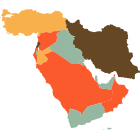Development Of The Communication Strategy For The Directorate General Of Local Administrations And Councils (DGLAC) - UN Habitat Lebanon
Background:
The Ministry of Interior & Municipalities (MoIM) in Lebanon was responsible for overseeing Unions of Municipalities (UoMs) and individual municipalities through the Directorate General of Local Administrations & Councils (DGLAC). Established in 2000, DGLAC had a legislative mandate to provide support for municipal activities, including technical studies, project advice, and oversight of official investigations. However, the department had faced persistent challenges, primarily related to funding shortages, which had hindered its performance and institutional capabilities. These challenges had resulted in operational deficiencies, including the absence of automation, training deficiencies, and inadequate equipment.
Recognizing the critical need to address these challenges, the United Nations Human Settlement Programme (UN-Habitat) and the United Nations Development Programme (UNDP) initiated the Municipal Empowerment and Resilience Project (MERP). Within this context, MERP identified a pressing need for DGLAC to enhance its communication and engagement strategies with various stakeholders. These stakeholders encompassed municipalities, UoMs, governmental agencies, ministries, civil society, development agencies, and the Lebanese public.
Triangle’s Assessment:
- Communication Strategy Development: Triangle’s primary task in this project was to formulate a comprehensive communication strategy for DGLAC. This strategy was designed to address the identified challenges and improve DGLAC’s ability to communicate its mission, vision, role, and organization to key stakeholders. This included not only local government entities but also governmental agencies, ministries, civil society organizations, development agencies, and the general Lebanese public.
- Social Media Presence: In addition to the communication strategy, Triangle established a robust social media presence for DGLAC across various platforms. This initiative aimed to raise awareness about DGLAC’s objectives and activities, creating a channel for interaction and engagement with stakeholders.
- Capacity Building: Beyond the initial development phase, Triangle focused on enhancing DGLAC’s capacity to independently maintain and update its social media platforms effectively. This aspect ensured the sustainability of the digital communication efforts beyond the project’s conclusion.
- Baseline Study: To kickstart the project, a baseline study was conducted. This study provided essential insights into DGLAC’s target audiences, helping to identify who these audiences were, what impacts communications should aim to achieve, and which platforms were most effective in reaching them.
- Media Reputation Analysis (MRA): A critical component of the project, the MRA analyzed media coverage and perceptions related to DGLAC’s services. It assessed the quality of and access to DGLAC’s services, challenges faced, and opportunities present, particularly during crisis periods. The MRA used objective indicators to score DGLAC’s performance, incorporating stakeholder interviews and benchmarking against local and international standards.
- Stakeholder Interviews: Triangle conducted semi-structured interviews with a diverse set of stakeholders to gain valuable insights into the communication strategy. These interviews helped identify key target audiences, their roles, and the best approaches to engage with them effectively.
- Benchmarking: The project involved an analysis of case studies from local, regional, and international sources that had successfully implemented communication campaigns for government departments undergoing reform. These studies provided insights into the strategies, challenges, and best practices that could be adapted to DGLAC’s context.
- Branding and Engagement Plans: A significant focus was on developing a branding strategy for DGLAC, including visual identity guidelines. This branding extended to web portals, social media platforms, and various communication materials. Engagement plans were created for media, key stakeholders, web portals, and social media, ensuring a well-rounded approach to communication.
- Internal and Crisis Communication: The project addressed internal communication processes to ensure efficiency within DGLAC. Additionally, a crisis communication plan was developed, outlining procedures, key messages, and actions to take in various crisis scenarios.
- Workplan and Monitoring/Evaluation: A detailed workplan with a clear timeline was established, describing each activity outlined in the strategy. A robust monitoring and evaluation plan was also developed to track the effectiveness of communication activities and inform future planning.
- Validation Workshop: Upon completion of the draft communications strategy, a validation workshop was conducted, involving stakeholders from MERP, DGLAC, and other relevant local and government entities. This workshop provided an opportunity to gather feedback and insights for finalizing the strategy.
Project:
Development Of The Communication Strategy For The Directorate General Of Local Administrations And Councils (DGLAC) – UN Habitat Lebanon

Duration:
March 2022 – July 2022
Lebanon
